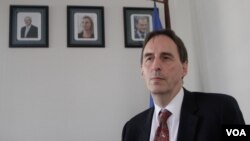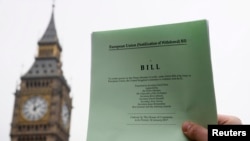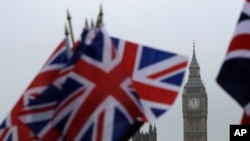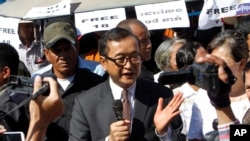On an afternoon in June last year while some 30 million British people went out to vote in a referendum to decide the United Kingdom’s future within the European Union, George Edgar was busy at his office in Phnom Penh, watching the results come in.
The former British diplomat and current E.U. Ambassador to Cambodia was appointed six months before the Brexit referendum and is a staunch supporter.
“Given the time here as a British citizen working for the E.U., it is no secret that I was on the side of the U.K. staying with the E.U.,” Edgar said in an exclusive interview with VOA Khmer early this week.
“Indeed I made sure I voted in the referendum, so I was surprised and disappointed with the result,” Edgar said.
Soon after the referendum, then-UK Prime Minister David Cameron, who campaigned for the Remain camp, stepped down, giving way to Theresa May who will oversee the Brexit process.
The May government brought the plan for royal assent this week, beginning the process of a British exit from the E.U.
“Brexit is a sign of increasing nationalism and xenophobia, and it’s bad for the E.U. and bad for the Western world,” said Sophal Ear, associate professor of world affairs at the Los Angeles-based Occidental College.
While many things have changed since U.S. President Donald Trump took office, the global role of the E.U. is not going to change any time soon, according to Ear, who authored the 2013 book Aid Dependence in Cambodia.
“If you see what’s happened with Trump and his actions being used to justify muzzling the media elsewhere or the cause of human rights, we could see the same thing with Europe if nationalist parties come to power,” he said. But “the US has one president. The EU is still a bunch of countries, so its actions will not become irrelevant (or used against it) overnight.”
Though he said a hard Brexit would be “regrettable”, Edgar told VOA Khmer that he was hopeful that it could be “encouraging” to the remaining 28 state members to move the E.U. “forward with renewed energy.”
“One of the reasons for me that attracted me to working with the E.U. in the first place is the fact that the E.U. as a whole can have a stature and influence on the global stage, which can be much greater than the influences of the member states taken individually,” he said.
“That would remain true even after the departure of the U.K., and it is something I believe very deeply,” Edgar added.
Regardless of the upheavals in Europe, Edgar said he was focused on what the E.U. is doing here in Cambodia in support of the country’s democratization process – including technical support for the National Election Committee – education, fisheries, public finance management reforms, and decentralization.
“Those aspects that I do, which are central to what we are doing here, are not affected by issues such as the decision of the British people that Britain would leave the E.U. and other things going on in Europe at the moment,” he said.
Electoral Reforms
The E.U., alongside Japan, has been assisting electoral reforms executed by the N.E.C. in the first phase with a biometric voter registration system, recording some 7.8 million voters for ahead of the commune elections in early June this year.
The N.E.C., which was overhauled after the controversial 2013 election, is also tasked with organizing the next general election, in 2018.
But pre-election political tension appears to have been mounting. Nearly 30 opposition members, civil society workers and government critics have been jailed over the past two years in what Edgar descried as “what looks like politically motivated judicial cases”.
One of those jailed was N.E.C. deputy secretary general Ny Chakrya, well-known as a prominent human rights worker before he was appointed to the election body. Rong Chhun, a prominent opposition-appointee to the N.E.C.’s nine-member leadership board, is also facing legal action.
Kem Ley, a well-known political commentator who was critical of the government - and, on occasion the opposition Cambodia National Rescue Party - was shot dead in last July at a busy café in the capital.
Long-term opposition leader Sam Rainsy last month announced his resignation from the presidency of the CNRP following amendments to the law on political parties that could have seen the CNRP dissolved if he remained in the position.
‘Complicated’ Politics
“There have been, over the past year, the significant tensions between the CPP and the CNRP,” Edgar said, adding that the situation was “concerning.”
Asked if such a situation has doubt whether the elections can be free and fair, the E.U. Ambassador said it would be a “mistake” to predict the quality of an election in advance.
“Trying to say now or trying to make the judgment now of the quality of the election that has not happened would be very wrong,” he said.
“We are very keen to see ... an environment that allows genuine electoral competition because it is an important aspect of multi-party democracy, which Cambodia set out in its constitution,” he said.











